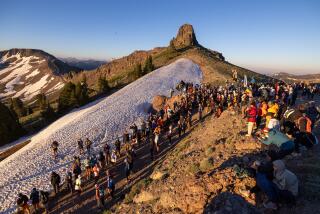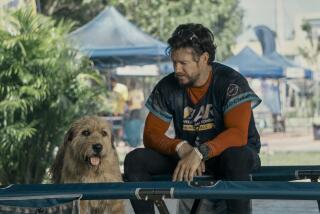Lights of Nome Shined Brightly : Iditarod: Jeff King mushes to victory in record time in a race marred by warm weather and illness among the dogs.
- Share via
NOME, Alaska — Jeff King kept telling himself “it’s just a dog race” as he followed a shooting star down a fast track into this frozen, forbidding outpost on the end of the Seward Peninsula.
But he knew better.
“There are some things mystical and magical about the Iditarod,” King, 37, said after winning the 21st edition of the 1,161-mile run from Anchorage in record time. “I had to get over that. I had to believe that there’s no reason I shouldn’t be able to win it (without) a miracle.”
King, a California-born plumber from Denali Park, Alaska, where he also is chief of the volunteer fire department, finished at 12:38 a.m. local time Wednesday (1:38 a.m. PST).
As a fire siren sounded to signal his approach, patrons emerged from neighborhood bars to watch King’s 11 remaining dogs trot down floodlighted Front Street under strings of colored lights, into the finishing chute and through the traditional burl arch, where a pressing crowd included his wife, three small daughters and his parents from San Rafael, Calif.
His elapsed time was 10 days, 15 hours, 38 minutes, 15 seconds, beating the record of 10:19:17:15 set by Martin Buser of Big Lake, Alaska, on the northern route last year. The southern route is used in odd-numbered years.
The next two finishers also broke the record: perennial contender Dee Dee Jonrowe, 38, of Willow, Alaska, who finished 32 minutes 35 seconds later, and 1983 winner Rick Mackey, who finished in in 10:18:07:55.
Others, including Buser and four-time winner Susan Butcher, struggled through a mysterious intestinal illness that affected 85% of the 68 dog teams that started the race March 6.
Buser set a fast early pace but backed off as his dogs became ill. He finished sixth, more than nine hours behind King, with 11 of the 20 dogs with which he started.
The mushers are allowed to start with as many as 20 dogs and drop some off along the way, but Butcher’s team was so stricken that she finished fourth, about four hours after Buser, with only eight of her original 18--the minimum permitted by the rules. She said only five or six were still pulling.
Five-time winner Rick Swenson finished later Wednesday with only 10 dogs.
Jim Leach, chief veterinarian for the race, said fecal and tissue samples were being checked to determine the ailment.
He suspects that the same unusually warm weather that made the trail firm and fast may have thawed out the food caches the teams had placed along the trail two weeks earlier. It was 36 degrees at the start in Anchorage, 19 at the finish in Nome.
Of about 1,300 dogs that started the race, three died. Two were killed in accidents, one when a team became tangled and the other when it stumbled and broke its neck while leading a charge off the trail after a fox. The third died of internal causes, with tests pending.
Those, King said, are the perils of the Iditarod trail, which was created in legend by an emergency sled dog run through the now abandoned Eskimo village during a diphtheria epidemic in Nome in 1925.
“For every team in every mile there’s a disaster lurking out there,” said King, whose best finish in three previous races was sixth last year. “I did my little ‘Star light, star bright’ tonight when the stars came out. I picked my star. I made my wish. It came true.”
King won $50,000, plus a truck and $3,000 in silver ingots for leading at the halfway point. Jonrowe collected $43,000 and Mackey $37,000 from the $400,000 purse.
“Jeff’s team was stronger . . . “ Jonrowe started to say afterward when King interrupted: “Faster, not stronger.”
Said King: “Martin (Buser) started off with a roar and that built momentum. I couldn’t try to keep up. My team wasn’t up for it that early in the race.
“But warm weather, no new snow on top of this concrete-hard, slippery ice . . . there was some texture to it, so it had good footing. The dogs weren’t slipping, and there was zero resistance for the sled.
“We’d look at each other and go, ‘What did we do to deserve weather like this?’ We’re supposed to be getting beat up and frozen.”
Jonrowe’s midway concern was Mackey, son of the ’78 winner Dick Mackey.
“If that guy isn’t the most cunning dog driver I’ve ever met, short of his dad,” Jonrowe said. “He did a fantastic job to get a 20-dog string up to the Yukon River and all the way to the coast, and they all had their lines tight”--meaning, all were pulling hard.
“At Unakleet, he was going to slip out of town. I was literally half-dressed as I chased Rick down the street, knowing that if I let this guy out of my sight this race could be over. Had he not had the problems he had, he’d have walked away with it.”
Ultimately, though, it was a two-dog night.
Said Jonrowe: “Last night in White Mountain, Jeff and I sat there and said, ‘Well, it looks like it’s you and me . . . and you know what, either way is fine.’ ”
More to Read
Go beyond the scoreboard
Get the latest on L.A.'s teams in the daily Sports Report newsletter.
You may occasionally receive promotional content from the Los Angeles Times.










